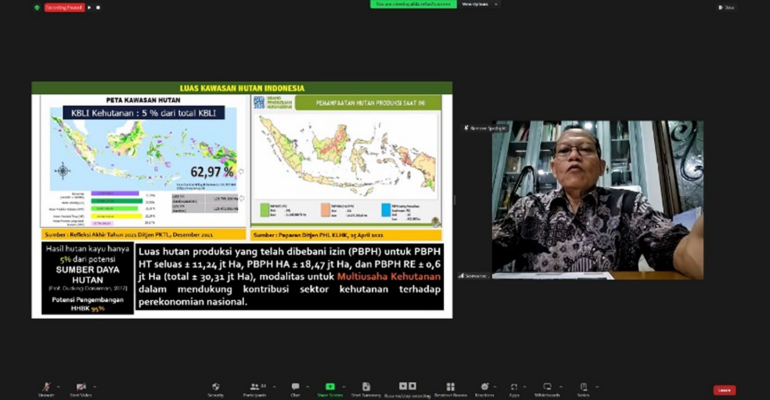Department of Forest Management IPB University Holds Public Lecture, Highlighting Multi Forestry Businesses

The Forest Management Department of the Faculty of Forestry and Environment of IPB University held a public lecture for the Postgraduate programme through the Forestry Business Management course. The public lecture took place online on 31/5.
This public lecture highlighted the opportunities and challenges of multiple forestry businesses by inviting guest speaker Dr Soewarso, Vice Chairman of Sustainable Plantation Forest Management, Indonesian Forest Entrepreneurs Association (APHI).
He presented the fact that timber forest products only accounted for 5 per cent of the potential forest resources, with the potential for wood-based forest development reaching 95 per cent. ‘The presentation of the Directorate General of Sustainable Forest Management (PHL) of the Ministry of Environment and Forestry (KLHK) stated that Indonesia’s forest area is only 5 per cent of the total Indonesian Standard Industrial Zone (KBLI),’ he explained.
Dr Soewarso also highlighted the importance of landscape ecosystem-based sustainable forest management after the Job Creation Law with an ecologically, socially and economically sustainable approach.
“However, low forest productivity, low contribution to national Gross Domestic Product (GDP) and challenges in production forest management are the focus of attention,” he said.
Dr Soewarso also highlighted the need for Multi Forestry Enterprises (MUK) as a new growth engine for the forestry sector, with an emphasis on the growing demand for Non-Timber Forest Products (NTFPs) and environmental services. “However, the implementation of MUK is hampered by regulatory, human resources, and financing constraints,” he said.
Dr Soewarso went on to say that the SKHA 2024 analysis shows that there are key issues such as low permit flexibility, limited technical skills, and difficulties in securing funding.
“However, the potential of multiple forestry businesses based on industrial clusters in various sectors such as food, energy, pharmaceuticals and cosmetics provides hope for wider development,” he said.
He continued, noting these challenges and potentials, strategic measures are needed to optimise the implementation of MUK and increase the contribution of the forestry sector to the national economy. (*/Lp) (IAAS/RUM)



